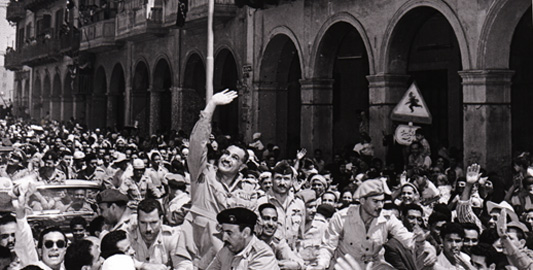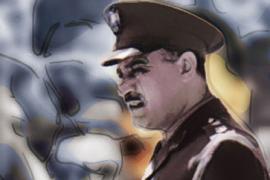Hassan Ibrahim Last Modified: 29 Feb 2008
A young military officer puts his visions for Arab social justice to the test.
Gamal Abdel Nasser receives a hero's welcome in Port Said in the Suez.
Gamal Abdel Nasser was not just a president of a country, but also the most charismatic leader and visionary the Middle East had seen for many centuries.
His strength of character was evident in his rhetoric, which mobilised Arabs from the Atlantic Ocean to the Gulf, but it also surfaced in the bold socio-economic programmes he introduced to Egypt and the region.
Many people in the Middle East believed Nasser when he boisterously declared victory and did not abandon him even when he admitted defeat in the 1967 Arab-Israeli war.
His funeral was the largest spectacle of mass grief ever witnessed in the region.
But why would the masses believe and support a leader who had not only been vanquished by the Israelis but also lost most of the Sinai, Jerusalem and the Golan Heights?
The simplest answer is that Nasser was the torch bearer who energised Egyptian and Arab politics, becoming a leading figure in the region.
Social justice
It was his firm belief in social justice that pushed him to try to implement socialist policies shortly after the 1952 revolution. However, these policies were not entirely suited to a society that was predominantly hierarchial, semi-feudalist, and agrarian.
Many Arabs did not abandon Nasser
even when he admitted defeat
in the 1967 war
As a result, a stratum of intellectuals and technocrats forced Nasser to adopt a more centralised decision-making process which in turn bred autocracy within the new government.
But contrary to the myth perpetuated by his enemies, Nasser was not the fire-brand revolutionary who "brandished his sword and called for the annihilation of Israel"; rather, he was grounded in a realistic approach to regional geo-politics.
He had the unique ability to balance building Egypt's infrastructure and economy with working for the liberation of Palestine - or at the very least, reaching the best possible peace settlement which ensures the inalienable rights of the Palestinian people.
Nasser was not a warmonger, having experienced firsthand the damage war can inflict on a civilian population. His experience during the 1948 war and the gruelling siege of the Fallujah pocket in Palestine instilled in him an abhorrence for military solutions.
He instead attempted to solve the problems that plagued post-monarchial Egypt through economic and social reforms.
Land reform
Before the 1952 revolution, the Egyptian economy had been dominated by the private sector - a modern application of the feudalist system in which one per cent of the population owned some 85 per cent of the land.
Nasser recognised that existing land ownership schemes were grossly unfair and were the root causes of economic and social disenfranchisement among the landed peasants.
He understood that if Egypt's revolutionary transformation was to have any chance of succeeding and inspiring regional change, the government would have to reverse the monarchial system of land ownership in which the farmers had been treated like serfs.
At a rally during one of his visits to a factory in Cairo, Nasser lamented the plight of the country's peasants and expressed his disappointment that there were some who objected to his land reform projects.
"Why can't they believe that the poor people of Egypt have the right to a decent life on this earth before they die?" he asked.
A standing ovation helped Nasser formulate the "nationalisation and confiscation of properties and businesses" economic plan he would later put into action.
State priorities
Nasser was very measured in his reforms. He did not confiscate all private properties in the manner of his contemporary Josef Stalin, the Soviet premier.
In maintaining the rights of the Egyptian peasantry, he established a ceiling of 200 feddans (roughly 200 acres) for private land ownership, thus ensuring that the class system was not shaken to the roots.
By introducing agrarian reforms, redistributing land and developing the economy along socialist lines in the late 1950s, Nasser revolutionised Egyptian society transforming the very mechanisms at its heart.
Following the 1952 and 1961 land reform initiatives, most of the country's industrial, financial and commercial undertakings were nationalised by the government, including management of the agricultural sector.
Both industrial and agricultural output, along with foreign investment grew considerably after the revolution. The construction of a giant steel mill in Helwan, along with building the Aswan Dam, were perceived as an enormous added value to the Egyptian economy.
One of his most memorable economic and strategic decisions was to re-nationalise the Suez canal, which had been under British-French control for decades - a move that would incur the wrath of many powers in the region.
Nasser's drastic reforms catapaulted Egyptian industry forward and into the modern age. Productivity surged becoming the highest - and the standard - in the Arab World.
Foreign intervention
As the Egyptian masses embraced Nasser and his reforms, many in the Arab world watched with envy – and in some cases, with poisonous jealousy.
Some Arab leaders did not appreciate the revolutionary changes Nasser was introducing to Egypt. When he decided to build the High Dam in Aswan, there was little regional or international financial support.
John Foster Dulles, the US secretary of defense during the Eisenhower administration, vowed that Nasser would never achieve his goals. He urged Arab governments not to deal with Nasser and to actively seek his demise.
Some historians attribute the bloody Yemen conflict - which depleted the power of the Egyptian army - to US prodding of Saudi Arabia to defeat and weaken Nasser.
Grounded
Nasser's ideals for a united Arab world
still resonate in the region today
Despite his fervour, Nasser never allowed his dreams to cloud his sense of reality.
In 1958, Syrian military and civilian leaders sought to unite their country with Egypt. Though Nasser was surprised by the sudden request and uncertain whether the time was ripe, he agreed.
The merger into the United Arab Republic (UAR) was viewed by many as the first step toward the founding of a Pan-Arab state, but it quickly succumbed to internal rivalries.
However, when a coup in Damascus ended the unity between Egypt and Syria, Nasser refused to use force to crush the separatist dissent.
That was the same wisdom and foresight he used to prevent Iraq's first attempt at occupying Kuwait in 1959. The Egyptian army did not have to fire a single bullet.
Compare that to the mess of 1991.
It was Nasser's belief that the battle for liberation must be waged everywhere in the region and he consequently supported such movements in Algeria, Yemen and even the Congo.
Revolutionaries like Ahmed Bin Bella, Loran Kabila and even the father of all revolutionaries, Che Guevara, visited Nasser and considered him an inspiration.
Despite the debacle of the UAR and the humiliating defeat in the 1967 war with Israel, Nasser did not lose sight of his Arabist mission.
He purged the army of the destructive elements that led to the crushing defeat and planned diligently to foment Arab unity and military strength to retake lands lost in 1967.
On September 28, 1970, Nasser passed away after trying to mediate between disputing Arab leaders but his legacy and ideals of a united Arab nation live on.
Source: Al Jazeera
Opinion: Nasser, the torch bearer - Arab Unity - Al Jazeera English



